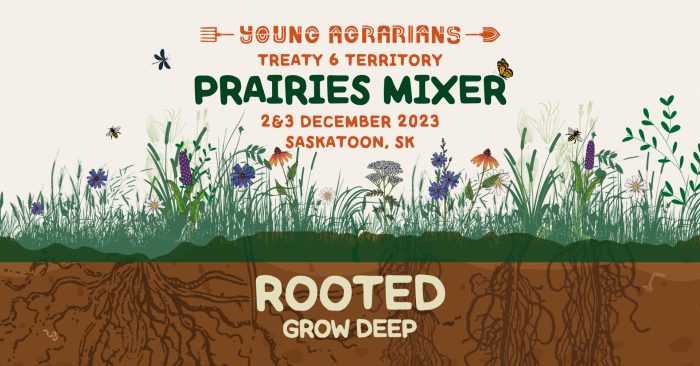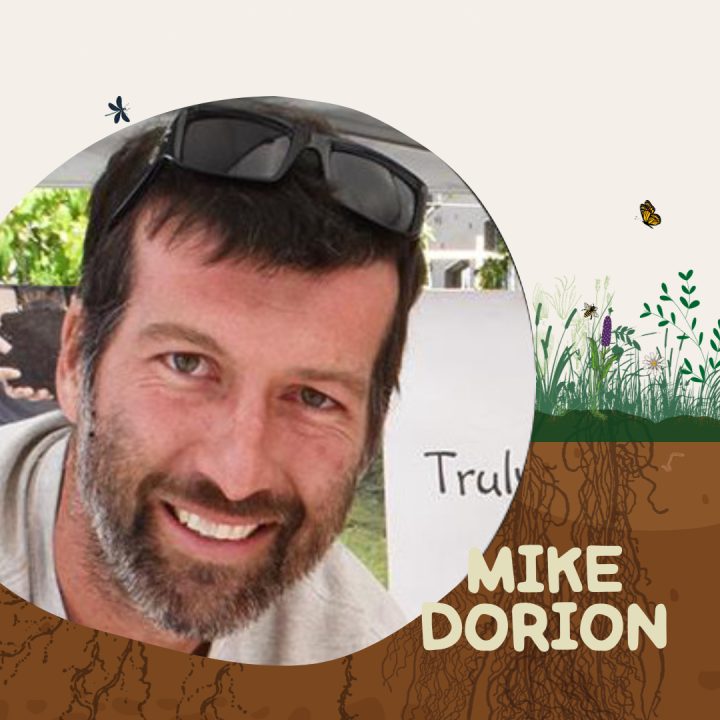The first-ever Prairies Mixer is happening on Dec 2-3, 2023 in Saskatoon, Saskatchewan
Calling all regenerative farmers, food growers, local food enthusiasts, and mixed-grass prairie advocates
Join us for a weekend of community building, knowledge sharing, and storytelling! This year’s theme is “Rooted, Grow Deep”, an ode to what remains of the mixed-grass prairie on the land we are farming on. This is an invitation to rediscover how vast and varied the grasslands used to be and find our individual connection to it in order to practice better stewardship and advocate for its conservation.
In the spirit of YA Mixers, this weekend is designed as a networking event and in particular, to build a strong and active community of new farmers in the prairies. It is a great opportunity to create transformative relationships among each other rooted in the common desire to steward the land by learning from one another and from Indigenous leaders in the spirit of reconciliation and relationship building. The mixer is open to everyone – whether you are 3 or 83, we love agrarians of all ages.
WHEN: Saturday and Sunday, Dec 2-3, 2023
WHERE: Beaver Creek Camp in Saskatoon, Saskatchewan. Treaty Six Territory
REGISTER: Please register on Eventbrite to reserve your spot.
COST: Tickets are pay-what-you-can basis in the suggested range of $50-$250. These tickets include accommodation, food from Fresh Dish Catering, and education over the course of Saturday and Sunday. The funds raised from ticket sales are used to cover the costs of organizing and hosting the event. This pricing model is often used to make events more accessible to a wide range of attendees while also ensuring that the event’s expenses are covered. People can choose to pay within their means while still participating in the event’s offerings. It’s a flexible and inclusive approach to pricing that can help reach a broader audience and provide valuable experiences.
No one turned away for lack of funds. Please let Lourdes know your needs at prairiesnetwork@youngagrarians.org.
PARTIAL POTLUCK DINNER: Dinner on Saturday will be a partial potluck- meaning we will have much of our meal cooked for us by our caterer, but any dishes that you can bring to share will augment the meal. Please bring a little card with a list of ingredients for your dish if possible.
ACCOMMODATION: Accommodation is included in the ticket price. Guest must bring their blankets, bedsheets and pillows if staying on-site.
CARPOOLING: If you are looking for or can offer a ride to or from the event, please use this Google spreadsheet to connect with others.
We welcome cancellations at any time – you can do so through Eventbrite, through the link in your registration confirmation email, or by contacting alex@youngagrarians.org. Please let us know if you aren’t able to attend.
COVID-19 PROTOCOLS: Please stay home if you have cold or flu-like symptoms, OR if you’ve been diagnosed with COVID-19
SCHEDULE
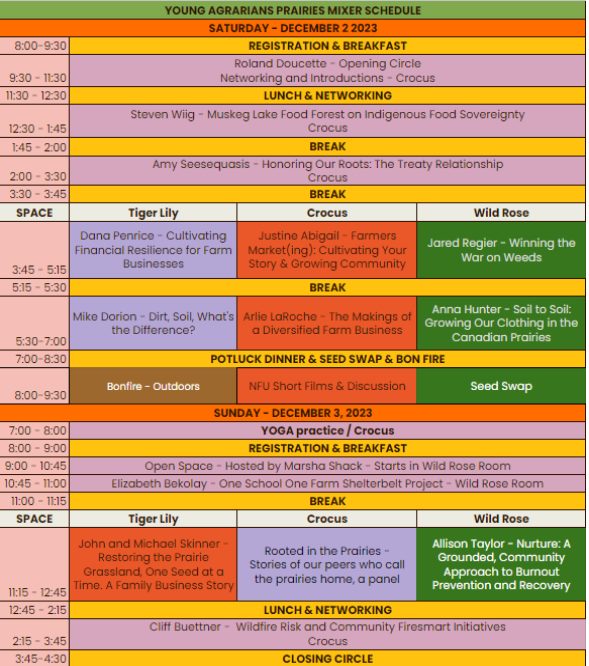
YA mixers are known for the remarkable connections made, such as new possibilities for selling, meeting someone with the land that you would like to work, or identifying a shared interest/resource. To make the most of this, come to the mixer with an openness to meet new people, share something that you have to offer (like employment, land or special skills) and something that you might need (such as specific tools, crop planning models, or mentorship).
SESSION DESCRIPTIONS AND SPEAKER BIOS
Opening Circle – Elder Roland Doucette
Honoring our Roots: The Treaty Relationship – with Amy Seesequasis
This informative session on Treaty relationships and Treaty identity, led by Amy Seesequasis – Treaty Relationship Consultant, will focus on the Numbered Treaties and provide an in-depth understanding of Treaty identity, the Treaty Relationship, and the context of land sharing, land preservation, and safe access to land.
About Amy Seesequasis:
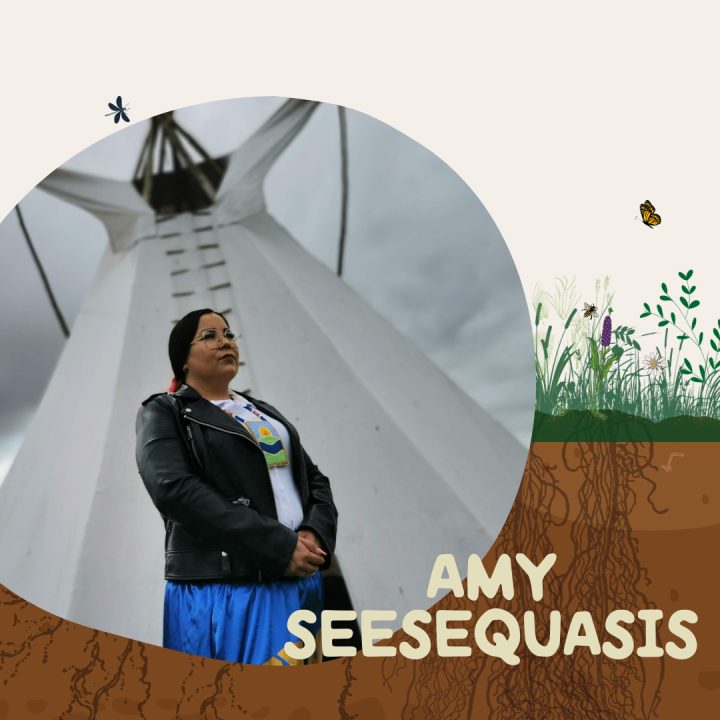 Amy is a member of the Beardy’s and Okemasis Cree Nation in Treaty 6 Territory and has Métis lineage to the community of Batoche. She has over a decade of experience as a Treaty content specialist, providing consultation and educational opportunities centered around Treaties, Indigenous peoples, and reconciliation. She has worked for the Correctional Service of Canada, University of Saskatchewan – Dept. of Indigenous Native Studies, and the Office of the Treaty Commissioner. Amy is a faculty member at Saskatchewan Polytechnic’s School of Continuing education where she works as an online instructor, curriculum developer and subject matter expert.
Amy is a member of the Beardy’s and Okemasis Cree Nation in Treaty 6 Territory and has Métis lineage to the community of Batoche. She has over a decade of experience as a Treaty content specialist, providing consultation and educational opportunities centered around Treaties, Indigenous peoples, and reconciliation. She has worked for the Correctional Service of Canada, University of Saskatchewan – Dept. of Indigenous Native Studies, and the Office of the Treaty Commissioner. Amy is a faculty member at Saskatchewan Polytechnic’s School of Continuing education where she works as an online instructor, curriculum developer and subject matter expert.
Amy is an independent Treaty Relationship Consultant and the owner and operator of Sisikwewiskwew Consulting Ltd. She is also the General Manager of the Creeland Dancers; an Indigenous dance company founded in 1984 by her Kohkum Therese Seesequasis and late Moshum Ken. Amy is on the coordinating committee for the Treaty Land Sharing Network; a grassroots movement and organization aimed at promoting and implementing the Treaty relationship through the context of land sharing.
She is first and foremost a mother and applies that perspective to all the work she does. She enjoys opportunities to share stories with others that will foster identity, inclusion and belonging. Amy feels it is important to promote the Treaty relationship and provide an understanding of the Treaties, Indigenous peoples and reconciliation, which will encourage inclusivity and respect for all.
Muskeg Lake Food Forest on Indigenous Food Sovereignty – with Steven Wiig and Edmond Lucier
About Steven Wiig:
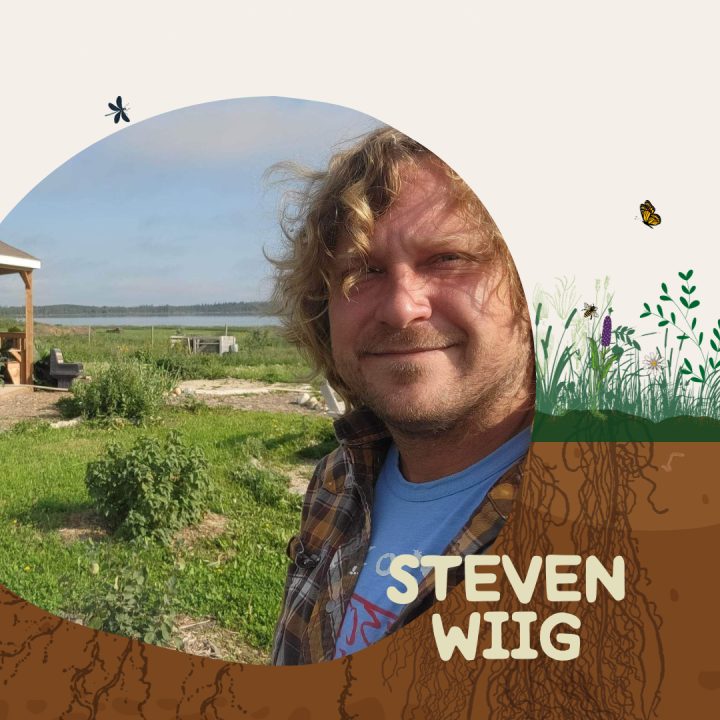
Steven Wiig received his Permaculture Design Certificate at the Panya Project in Thailand in 2011, then continued to work and learn on various Permaculture projects around S.E. Asia until 2014. That year he made the move to Kenya where he completed a Permaculture Consulting training and worked with others to found the Oltumo Maasai Project. This was a demonstration and education site which worked with the Indigenous Maasai people to find solutions for their transition from nomadic to settled living. While spending winters in Kenya, Steve also managed his Saskatoon-based regenerative landscaping company, Holistic Landscape and Design.
About Edmond Lucier:
Edmond Lucier is a Muskeg Lake Cree Nation elder and a member of the Lands Advisory Authority for Muskeg Lake. He is a retired teacher who works with several on-reserve committees to strengthen traditional environmental knowledge within a community that strives for food security and economic development.
Cultivating Financial Resilience for Farm Businesses – with Dana Penrice
Farm finances can be tricky at the best of times! It is challenging to account for the many costs that go into creating the bounty that comes from our farms and because of that it is difficult to know whether an enterprise is making or losing money. Dana will lead us through a finance framework to better understand how to determine if our farm enterprises are viable.
About Dana Penrice:
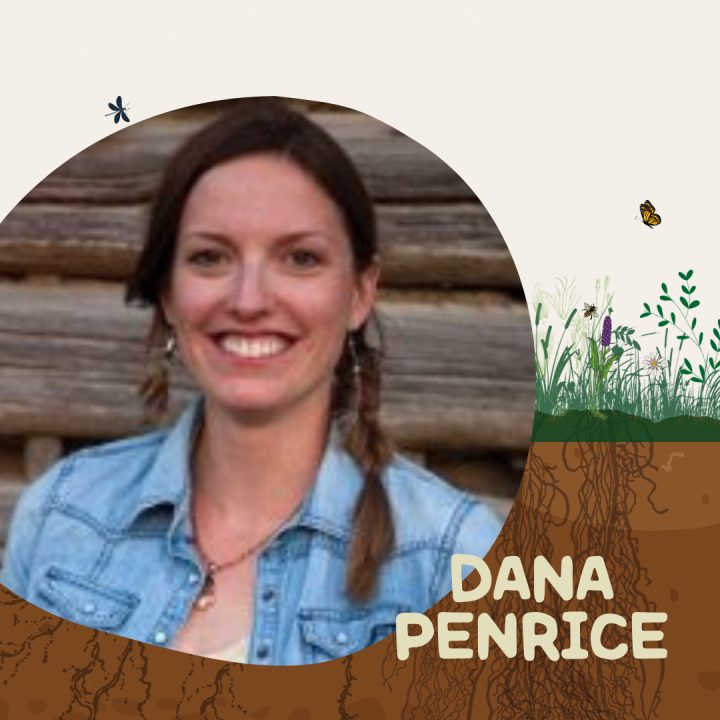
Dana strives to support inspired thinking and action in agriculture and rural communities. By thinking broadly and deeply about the systems upon which our society depends, Dana sees us better positioning the industry and our communities for the future. Dana’s work with Holistic Management Canada and with the Human Venture Institute has been foundational in developing her passion for supporting people to become resourceful, resilient, responsible and adaptive. Dana’s formal education was in Animal Science, earning a B.Sc. from the U of A but her much-valued informal learning has come from being on the land with other humans, flora and fauna. She believes that grazing livestock and poultry can heal our planet.
Farmers Market(ing): Cultivating Your Story & Growing Community – with Justine Abigail
As young agrarians, you’re not just cultivating the soil and growing food, you’re also cultivating your story and growing a community of people who care for our ecosystems! In this interactive workshop, we’ll learn the importance of digital marketing and communications in serving your goals as food growers, farmers, fishers, market gardeners, seed savers, beekeepers, and community gardeners. Together we will:
- Explore the basic principles of digital marketing and communications
- Understand the importance of your audience
- Identify the tools and technology at your disposal
- Share tips on cultivating your story and creating content
- Develop your digital marketing toolbox!
Join us for Farmers Market(ing): Cultivating Your Story & Growing Community to gather all the ingredients to craft a deliciously effective digital marketing and communications strategy for your farm business.
About Justine Abigail:
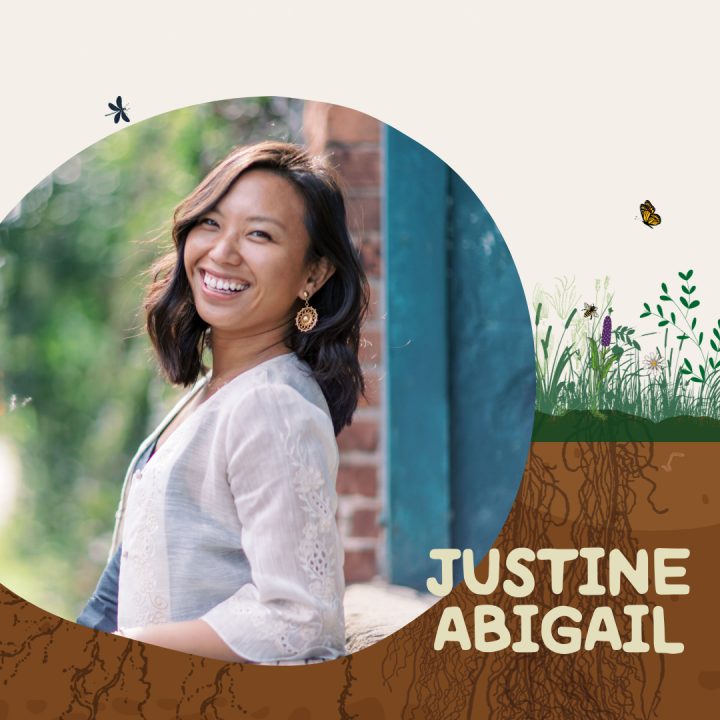 Justine Abigail Yu (she/her) is the founder of Living Hyphen, a community and multimedia platform that explores what it means to live in between cultures as a hyphenated Canadian – that is, an individual who calls Canada home but who has roots elsewhere. She is an award-winning workshop facilitator whose work with Living Hyphen has been featured on international, national, and local media outlets including the Globe & Mail, CTV National News, and the CBC. She was also named a “Changemaker” by the Toronto Star in October 2021. Justine Abigail is a fierce advocate for equity and anti-oppression. Her mission is to stir the conscience and spur social change. Learn more at www.justineabigail.com and www.livinghyphen.ca.
Justine Abigail Yu (she/her) is the founder of Living Hyphen, a community and multimedia platform that explores what it means to live in between cultures as a hyphenated Canadian – that is, an individual who calls Canada home but who has roots elsewhere. She is an award-winning workshop facilitator whose work with Living Hyphen has been featured on international, national, and local media outlets including the Globe & Mail, CTV National News, and the CBC. She was also named a “Changemaker” by the Toronto Star in October 2021. Justine Abigail is a fierce advocate for equity and anti-oppression. Her mission is to stir the conscience and spur social change. Learn more at www.justineabigail.com and www.livinghyphen.ca.
Winning the War on Weeds – with Jared Regier
Most new vegetable growers focus on learning the skills they need to grow vegetables, naturally, but the reality is that the systems that most gardeners use to grow annual vegetables are also very well suited to support growth of weeds! Without the right strategies in play, weed control can cost a gardener an extraordinary amount of labour while significantly decreasing vegetable yields. This scenario leaves a grower exhausted and frustrated at the end of the season with not a lot of food to show for their efforts.
So how do we encourage the growth of our vegetables while simultaneously discouraging the growth of weed populations? Join Jared to discover the remarkable superpowers of weeds and learn how to intelligently fight back by controlling the light, water, and soil around your vegetable crops. Believe it or not, it is possible to win the war on weeds and this is when vegetable growing becomes truly delightful!
About Jared Regier:
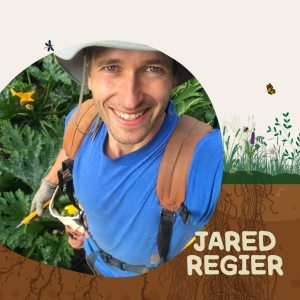
Jared Regier is an urban farmer and educator from Saskatoon, Saskatchewan who is passionate about building a more sustainable future. He loves teaching people how to grow their own food because it is such a powerful vehicle for positive change in individuals and communities.
For 6 years, Jared owned and operated an award winning urban farm, so he’s pretty comfortable in the vegetable world today. His first career as a high school teacher helped him develop an ability to simplify and communicate complex ideas. So when the farm started to get noticed and people began to ask if they could learn how to grow vegetables like that in their own backyard, it was only natural for Jared to answer the call. Now, his teaching and farming experience have found perfect harmony at the Vegetable Academy where he aims to put the knowledge and tools of the vegetable farmer in the hands of the home gardener.
Jared’s approach to teaching is organized, logical, and light hearted. He loves to learn and enjoys passing on these lessons to his students so he can watch(see) them experience success too. His practical lessons are always rooted in first hand experience and/or scientific studies because there’s no sense in passing on misinformation. Jared delights in helping others take responsibility for growing their own food, and the limitless number of learning opportunities in the vegetable garden are sure to keep this work interesting for many years to come.
The Makings of a Diversified Farm Business – with Arlie LaRoche
How do you go about building a small scale, diversified farm business? Or maybe the bigger question is why?
Today, Farm One Forty markets pasture-raised pork, grass-fed beef and lamb, honey, seasonal vegetables and grains. Following a holistic management approach, raising multiple species of livestock and providing them with different sources of forage in rotation with other land uses makes this regenerative farm a busy place. They have worked to reclaim alkali and saline areas with perennials, and ensure wetland and riparian areas are protected from overuse. As we expand our operation, we are increasingly experimenting with multi-species cash crops, and poly crops grown for grazing use.
But this didn’t just happen by accident overnight. There were many trials and tribulations along the way. Arlie is excited to share her journey in agriculture and hopes to inspire young people to pursue this career because we desperately need more farmers.
About Arlie LaRoche:
 From a small mixed farm to pioneering regenerative agriculture, Arlie LaRoche’s journey has been about growth, sustainability, and a passion for food.
From a small mixed farm to pioneering regenerative agriculture, Arlie LaRoche’s journey has been about growth, sustainability, and a passion for food.
A native of eastern SK, her roots are deeply intertwined with the farming culture.
After exploring the world and immersing herself in environmental consulting, she was drawn back to the soil. Alongside her husband, Brett, they transformed a personal passion project into the thriving Farm One Forty.
It was a workshop with renowned sustainable agriculture expert, Joel Salatin, that catapulted Farm One Forty from a hobby farm to a recognized local business. Farm One Forty isn’t just a farm; it’s an experience. Nestled near Saskatoon, it boasts pasture-raised pork, grass-fed beef and lamb, the sweetest honey, and vibrant yields of seasonal vegetables and grains.
For Arlie, Farm One Forty is more than a business; it’s a movement. With agritourism becoming a significant pillar of her business, immersive experiences and exquisite on-farm dinners offer visitors a taste of the land’s bounty. She’s on a mission to bridge the divide between bustling cities and tranquil farms, aiming to reintroduce people to the origins of their food.
Embracing the global trend of farm-to-table dining and the renaissance of local produce, 2019 marked a new chapter with the launch of Odla Restaurant & Market on Broadway in Saskatoon. A gastronomic celebration of the province’s rich produce, Odla sources its ingredients predominantly from Farm One Forty and other local farms, epitomizing Arlie’s vision: simple, delicious, and deeply rooted in the land.
Soil to Soil: Growing our clothing in the Grasslands of the Canadian Prairies – with Anna Hunter
So often in farming spaces we talk about the importance of what we put into our bodies, but seldom do we dive into what we put onto our bodies. Historically our clothing was an agricultural product – rooted in our landbase. Now, we are disconnected from the source and materials and our extractive clothing industry is responsible for environmental degradation, atrocious working conditions and millions of tons of landfill waste. But we can build regional textile communities that work to regenerate land, strengthen our agricultural systems and provide meaningful employment in rural communities. A re-emergence of cottage industry textiles can lead to healthier environments and a soil-to-soil clothing model connects us to land, animal and community.
About Anna Hunter:
 Anna Hunter is a first generation sheep farmer and wool mill owner in Eastern Manitoba, Treaty One Territory. Anna, her husband Luke, and their two kids raise Shetland sheep and run the only wool mill in Manitoba. Anna is passionate about building community and connecting rural fibre farmers with urban consumers, fibre artists and crafters. Anna believes that regenerative agriculture and climate beneficial food and clothing is integral to moving forward as farmers, fibre artists and Manitobans. Anna is passionate about growing a vibrant Canadian wool industry and has recently published her first book Sheep, Shepherd and Land. To learn more about Anna and her farm/wool mill, check out www.longwayhomestead.com
Anna Hunter is a first generation sheep farmer and wool mill owner in Eastern Manitoba, Treaty One Territory. Anna, her husband Luke, and their two kids raise Shetland sheep and run the only wool mill in Manitoba. Anna is passionate about building community and connecting rural fibre farmers with urban consumers, fibre artists and crafters. Anna believes that regenerative agriculture and climate beneficial food and clothing is integral to moving forward as farmers, fibre artists and Manitobans. Anna is passionate about growing a vibrant Canadian wool industry and has recently published her first book Sheep, Shepherd and Land. To learn more about Anna and her farm/wool mill, check out www.longwayhomestead.com
Dirt, Soil, What’s the Difference? – with Mike Dorion
Soil doesn’t like to be treated like Dirt, so why do we treat it that way? We have forgotten that we are a part of nature and this natural system. So let’s get down to the root of it and reconnect with this valuable resource, SOIL, that is responsible for the majority of life on this planet. What’s going on in our soils, how can we understand it and work within its boundaries? Remember, it all starts in the soil.
About Mike Dorion:
He loves food! Grocery stores just cannot match the tastiness from his Grandma’s garden.
Many people from his generation have missed out on precious skills that were not passed down. We have to find other teachers.
Starting with a Gardening class put on by the Calgary Horticultural Society, he became immersed. It continued with his Permaculture Design Certificate, SPIN Farming, Greenhouse Design, Compost Facility Operators Certificate, and mentoring in Soil and Soil Microbiology. He is currently working on his Soil Food Web Advisor role with the Life in the Soil program put on by Elaine Ingham, and sits on the board of Calgary Permaculture Guild. He is also working with Highfield Farm to explore and produce quality compost and has a company that provides microbially-rich nutrient sprays for yards.
Depths of Field Film Showing – with National Farmers Union
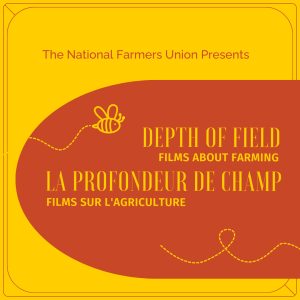 The Depth of Field films showcase Canadian farmers and farm workers and their sustainable farming practices on and off the land, bridging the gap between eaters and their food source. Rotational grazing, seed saving, building healthy soils, and working for social justice–different farmers highlight their own priorities and, together, these films tell the story of farming practices that would create the local food system we all want. To learn more, visit nfu.ca/filmsaboutfarming.
The Depth of Field films showcase Canadian farmers and farm workers and their sustainable farming practices on and off the land, bridging the gap between eaters and their food source. Rotational grazing, seed saving, building healthy soils, and working for social justice–different farmers highlight their own priorities and, together, these films tell the story of farming practices that would create the local food system we all want. To learn more, visit nfu.ca/filmsaboutfarming.
About NFU:
The National Farmers Union is Canada’s national farm organization committed to family farms. Promoting agroecology and food sovereignty for 50+ years, the NFU does not waver in our vision for farmers, eaters, and the earth, embedded in social and economic justice in Canada and internationally.
One School One Farm Shelterbelt Project – with Elizabeth Bekolay
Shelter: Addressing Biodiversity Loss, Climate Change, and Eco-Anxiety Through Community Planting Projects with One School One Farm Shelterbelt Project.
About Elizabeth Bekolay:
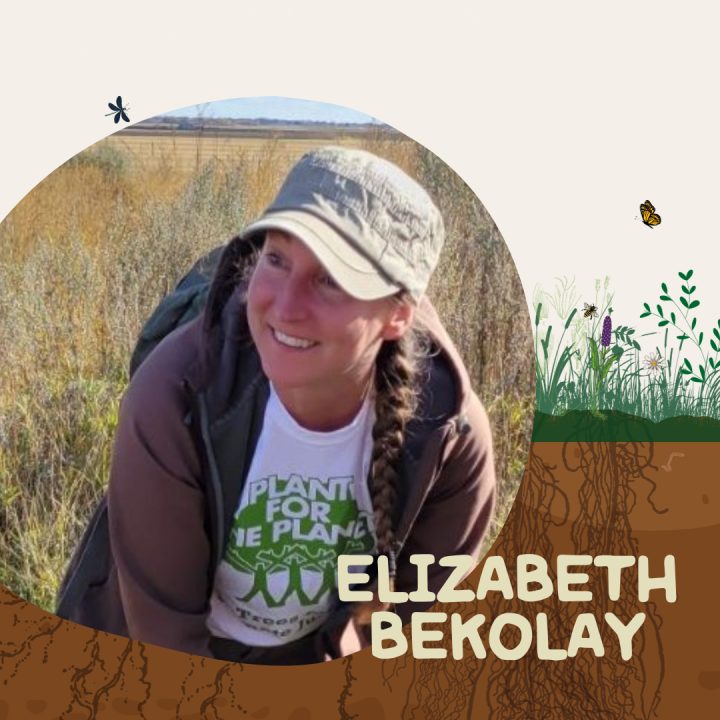
Elizabeth Bekolay started her ecological studies as a feral Gen X child growing up in the boreal forest along the North Saskatchewan River. While completing formal studies in biology and ecological education, circa 2005, she started working in the very same valley where the Prairie Mixer is being held. She is currently spending half her time as a nature-based science educator at Brightwater Eco-Science and Indigenous Learning Center with the Saskatoon Public School Division. During the growing season Elizabeth runs a small business called ‘Lichen Nature Design and Education’ through which she designs and implements small scale prairie restorations and ecological gardens. During winter Elizabeth writes books based on stories she told her children when they were young. She published her first children’s science fantasy, Nature’s Apprentices: The Magic of the Peatlands, last November. And because she is a Gemini whose friends and family all believe she has mad ADHD, she’s also the half time executive director and founding member of One School One Farm Shelterbelt Project, on which her presentation will be based. Shelter: Addressing Biodiversity Loss, Climate Change, and Eco-Anxiety Through Community Planting Projects with One School One Farm Shelterbelt Project.
Nurture- A grounded, community approach to burnout prevention and recovery – with Allison Taylor
Tending to our inner and outer landscapes enables us to root down so that we can grow and bloom. In doing so, we may ask ourselves- what makes us feel grounded? To the earth, each other, ourselves, and our communities? How do we nurture these landscapes. In this workshop we will journey together through an exploratory discussion on the topic of health and wellness within the farming sphere. We will discuss tools, practices, resources, and several aspects of holistic wellbeing within a relational framework. By conversing together, the recovery process, even in the face of addictions, can be beautifully woven into a fabric of being that is balanced and whole. Where joy and despair co-exist, and where we remember our innate essence that guides us home.
About Allison Taylor:
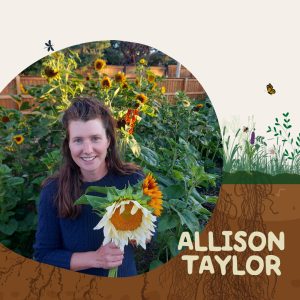
Allison is a weaver of women’s health and a support worker for farmers. She has spent the last decade involved in the organic vegetable and small mixed farming sector in many different “farm roles” including operating her own farm business, farming together with others as well as being a farmworker. She currently works as a coordinator for a community food farm and orchard. After experiencing a mental health breakdown in a rural setting in 2021, she realized her struggles were not hers alone, and that better mental health supports were needed for all members on and off the farm and within rural communities. She recognizes the challenges that come when faced with stressors on the farm and the interconnectedness of livelihood and lifestyle within agriculture and local food.
Allison is a mature student at the University of Regina working towards completing an undergraduate degree in Sociology and resides in Moose Jaw with her partner and two fur babies (Mr. Beans and Miss Poppy). Through her endeavours, she is slowly combining her passion for women’s health rooted in horticulture therapy, motherhood and flower growing. Her hope is that by fostering resiliency and support in mental and physical health together, the long-term future of farming can become one which is grounded in deep appreciation for the earth and each other.
Restoring the Prairie Grassland, one seed at a time. A family business story – with John and Michael Skinner
This presentation will look at their development of a small agricultural/horticultural business in a niche market, highlighting some of their successes (and failures!) along the way. It will also discuss their expansion of the business recently to include their son, Michael, who grew up working on the farm, left to obtain a degree in biology and then pursued a career in conservation biology with Parks Canada for 7 years before returning home in 2022 to manage the farm’s ecological restoration projects and try his hand at farming.
About John and Michael Skinner:
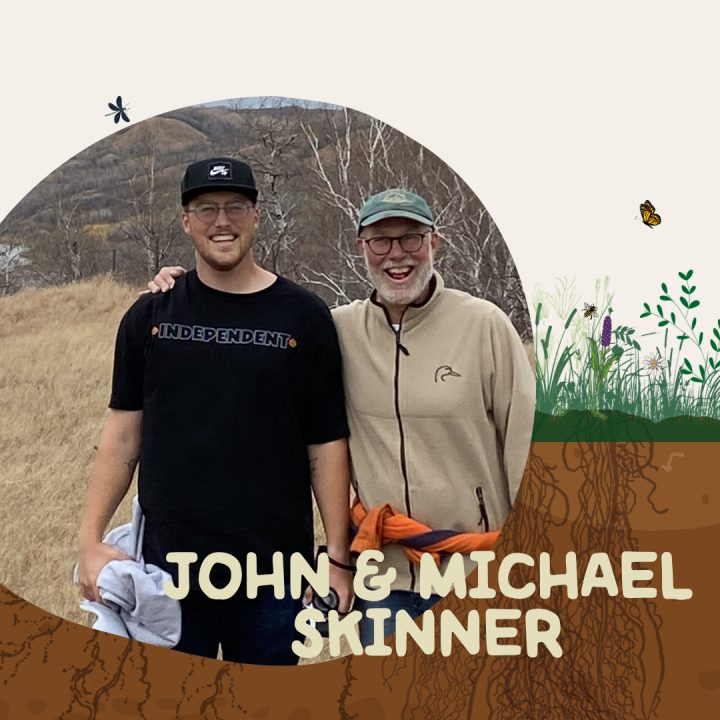 Skinner family involvement in Manitoba prairie horticulture stretches back more than a century. John Skinner has been growing native seed on a contract basis and on the open market since 2000. He has increased native seed extensively for Grasslands National Park. Recently, he has supplied much of the native seed, both grasses and forbs, for the Cheerios/General Mills Agricultural Pollinator Habitat Program on the Canadian prairies. Currently, and in addition to seed production, he is working on a large (300 acre) ecological restoration for and with a local conservation organization. John’s experience extends to growing native grasses and forbs, collecting wildflower seed from native prairie remnants and restoring native prairie. In 1993, John and Jo-Anne moved home to Manitoba. John had accepted a teaching job at the local high school and the family purchased a quarter section of land with a small house on it from a family member.
Skinner family involvement in Manitoba prairie horticulture stretches back more than a century. John Skinner has been growing native seed on a contract basis and on the open market since 2000. He has increased native seed extensively for Grasslands National Park. Recently, he has supplied much of the native seed, both grasses and forbs, for the Cheerios/General Mills Agricultural Pollinator Habitat Program on the Canadian prairies. Currently, and in addition to seed production, he is working on a large (300 acre) ecological restoration for and with a local conservation organization. John’s experience extends to growing native grasses and forbs, collecting wildflower seed from native prairie remnants and restoring native prairie. In 1993, John and Jo-Anne moved home to Manitoba. John had accepted a teaching job at the local high school and the family purchased a quarter section of land with a small house on it from a family member.
ROOTED in the Prairies – a conversation with farmers, growers and artists who call the prairies home – with Christel Lanthier, Jordan River, and Lourdes Still. Moderated by Melanie Buffell
About Christel Lanthier:
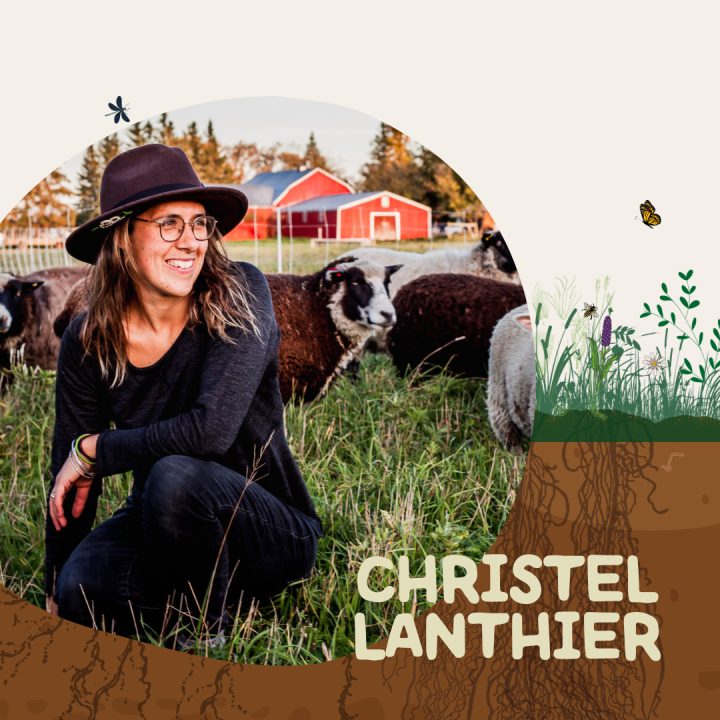
About Lourdes Still:
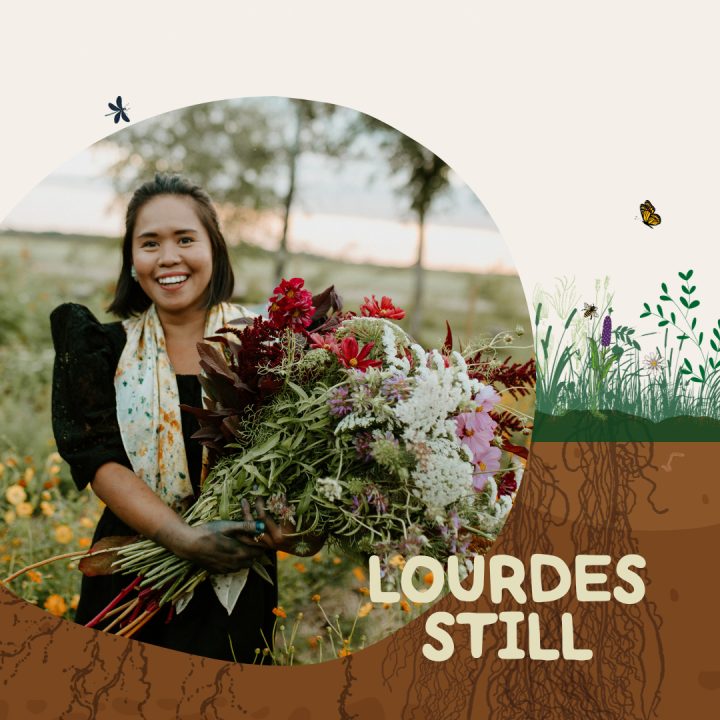
Lourdes joined Young Agrarians last July as the new Prairies Network and Communications Coordinator. When not planning events and creating content for YA, she juggles the roles of a flower grower, a natural dyer, and an experience guide at Masagana Flower Farm & Studio. A seasonal flower farm in southeast Manitoba specializing in growing plants and flowers that can used as natural dye sources.
She started as a self-taught flower grower, natural dyer, and tourism operator but has since learned and trained from industry leaders like:
Floret Farm where she learned how to turn her front yard into garden beds and maximize growing at a 4,800 sq ft .Caitlin French and Maiwa School of textiles for the foundational knowledge on natural dyeing and, Celes Davar and Eastman Tourism on how to host well her on-farm experiential tourism called Tinta Experience.
Her farm may be seasonal, but her floral-dyed projects are year-round. She is in the first year of having a new studio-in-the-woods at the farm and currently exploring all the programming possibilities she can implement to show others that growing joy through flowers and creating magic through plant dyes are right at our fingertips!
About Jordan River:
Jordan River is a first-generation Canadian farmer and horticulturalist who farms on land close to Bordan, SK. He tends sheep, pigs, and turkeys. Jordan’s roots come from Jamaica, his mother was a 4th generation Canadian and his dad moved here as an adult. Jordan is the president of the BIPOC caucus for the National Farmers Union and has been involved with community-based food and environmental work for many years. He has worked with the Muskeg Lake Cree Nation leading a food forest project. He has a lot of experience growing and propagating perennials and is passionate about food security and accessibility. He currently spends time out here with kids at Beaver Creek Camp facilitating their relationship with the land. Jordan is a new Papa and now gets to share his passions with his child. If you are lucky, you may get to experience Jordan performing a puppet show or a rap about composting or gardening.
Wildfire Risk and Community Firesmart Initiatives – with Cliff Buettner
About Cliff Buettner:
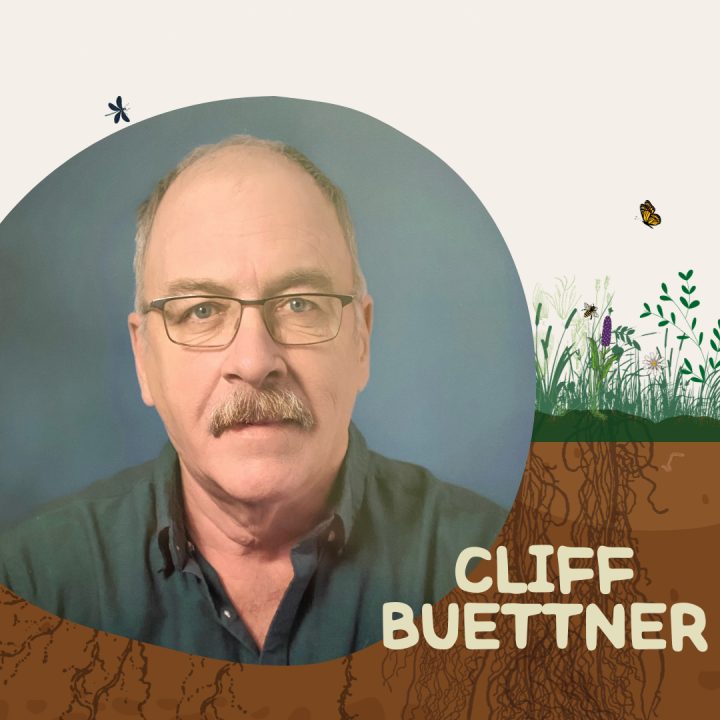 Cliff Buettner is a recognized authority in the field of wildfire management and environmental protection. He has been instrumental in representing the Prince Albert Grand Council (PAGC) on various fronts, such as the Firesmart Canada Technical Working Group and as the Vice President of the Prince Albert Model Forest Inc., which is an integral part of the Canadian Model Forest Network. In his current role, Cliff oversees Response Service contract administration for 36 First Nation sustained-action fire crews in 12 First Nations, as part of a Saskatchewan Response Service Agreement. Moreover, he manages the Saskatchewan First Nations Emergency Management, PAGC Search and Rescue, and Recovery SARSAV Chapter for all Saskatchewan First Nations.
Cliff Buettner is a recognized authority in the field of wildfire management and environmental protection. He has been instrumental in representing the Prince Albert Grand Council (PAGC) on various fronts, such as the Firesmart Canada Technical Working Group and as the Vice President of the Prince Albert Model Forest Inc., which is an integral part of the Canadian Model Forest Network. In his current role, Cliff oversees Response Service contract administration for 36 First Nation sustained-action fire crews in 12 First Nations, as part of a Saskatchewan Response Service Agreement. Moreover, he manages the Saskatchewan First Nations Emergency Management, PAGC Search and Rescue, and Recovery SARSAV Chapter for all Saskatchewan First Nations.
At present, Cliff is at the forefront of the PAGC Wildfire Resilience Initiative. This vital initiative focuses on documenting Indigenous Wildland Fire knowledge to facilitate intergenerational knowledge sharing and build relationships across institutions and communities. Through this initiative, he has established research partnerships as a co-principal investigator in Wildfire Resilience Initiatives with Queen’s University.
Additionally, Cliff is a dedicated member of the Canadian Prairies Prescribed Fire Exchange, where he continues to provide training and develop skills related to Ground Ignition applications for First Nations community protection and habitat restoration, primarily through cultural burning in the Cumberland delta. He has played an instrumental role in creating the website wearefire.ca, which serves as a valuable toolkit for indigenous-led fire practices.
Cliff has shared his wealth of knowledge and expertise in speaking engagements at various notable events like the Wildfire Canada Conference, and the BC Wildfire Summit.
About the caterer:
fresh dish catering
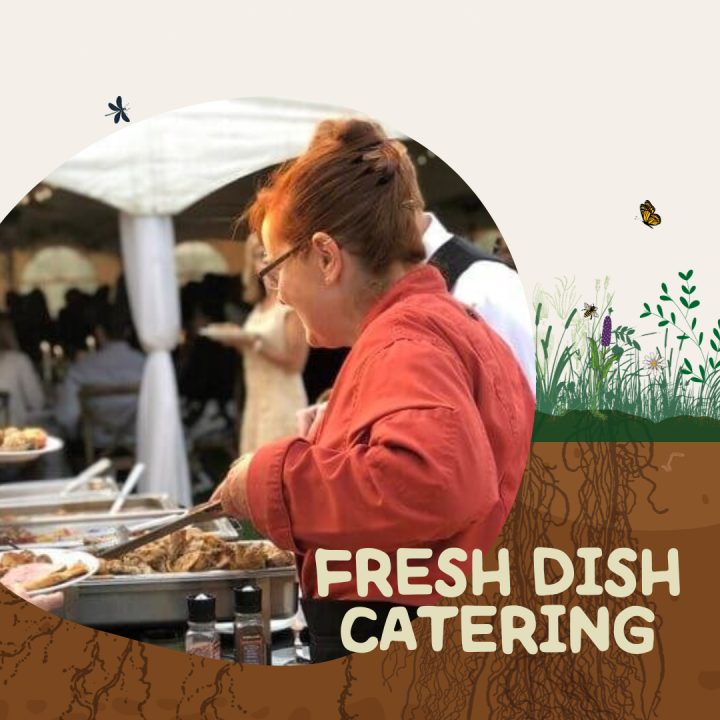
We are a leading local provider of delicious quality food.
All our dishes are handmade with the freshest ingredients available. As a team of women who have dedicated their professional lives to excellence in cuisine, we create mindfully and consciously. From food purchasing all the way through to handling and presenting, we operate with integrity and respect – to our clients, to each other, and to the food. And we believe that comes through in our exquisite flavours.
For questions or inquiries, email Lourdes at prairiesnetwork@youngagrarians.org
Subscribe to our newsletter to keep up to date on the latest with Young Agrarians.
The Prairies Mixer is made possible with the generous support of Prairies Food System Vision.

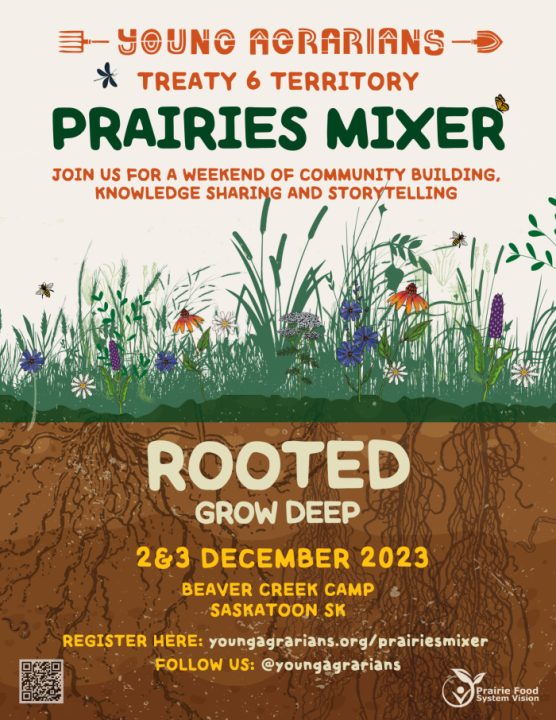


 Filter by Popular Categories
Filter by Popular Categories